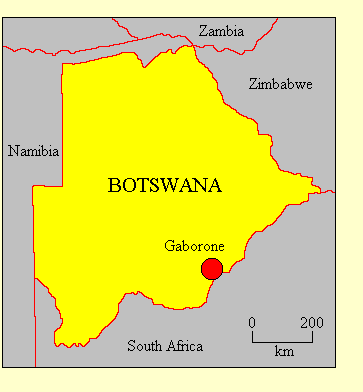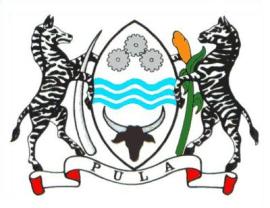

REPUBLIC OF BOTSWANA
• Official name: Republic of Botswana (Lefatshe la Botswana)
• Location: Southern Africa
• International organisations: African, Caribbean and Pacific Group of States, African Union,
Commonwealth of Nations, Non-Aligned Movement, United Nations, World Trade Organisation
• Borders: Namibia, South Africa, Zambia, Zimbabwe
• Coastline: None
• Land area: 600,370 Km2
• Population: 2,000,000
• Annual GDP (PPP) per capita: US$13,100 (2009 CIA estimate). World ranking: 66
• Ethnicity: Over 90% of the population are of African stock, and about 80% are Tswana.
The largest minority groups are the Kalanga (11%) and Basarwa (3%). There is a 7%
European minority.
• Languages: English is the official language and the language of government and
business: it is the first language of about 5% and the second language of about 30%. Over
70% speak Tswana. Other languages include Kalanga (11%), Kgalagadi (3%), Afrikaans (2%),
Herero (2%), Shua (2%) and Yeyi (2%).
• Religion: Indigenous religions 85%, Christian 15%.
• Form of government: Presidential democratic republic. Botswana is divided into ten
districts and four municipalities.
• Capital: Gaborone
• Constitution: The Constitution of the
Republic of Botswana came into effect on 30 September 1966.
• Head of state: The President, chosen by the legislature for a five-year term.
• Head of government: The President, who appoints the Cabinet.
• Legislature: Botswana has a bicameral legislature. The National Assembly (no website) has 47
members, of whom 40 are elected for five-year terms from single-member
constituencies, four are co-opted by the elected members and three, including the Speaker, are ex
officio. The House of Chiefs is composed of 15 members, of whom eight are the designated
Paramount Chiefs of the major Tswana tribes, four are non-Tswana chiefs elected by the body of
tribal chiefs, and three are co-opted by the first two groups.
• Electoral authority: The
Independent
Election Commission conducts national elections.
• Freedom House 2011 rating: Political Rights 3, Civil Liberties 2
• Transparency International Corruption Index: 58% (33 of 178 countries rated)
• Reporters Without Borders Press Freedom 2010 Index: 82.5% (62 of 178 countries rated)
• Heritage Foundation Economic Freedom 2010 Index: 68.8% (40 of 179 countries rated)
Political history
Before the mid 19th century the Tswana lived in what is now northern South Africa, but
under pressure from the northward advance of the Afrikaaners some Tswana migrated into what is
now Botswana, displacing the indigenous San people. The Afrikaaners continued to move
into Tswana lands, and in 1885 the Tswana king appealed to the British for protection.
The British then created the Bechuanaland Protectorate (Bechuana being an alternative
spelling of Botswana).

When South Africa became independent in 1910 it was expected that Bechuanaland
would be handed over by Britain, but the British heeded Tswana appeals not to place
them under Afrikaaner rule. Bechuanaland remained a British protectorate, and in 1961
internal self-government was granted. Full independence followed in 1966, with the
traditional Tswana leader Seretse Khama becoming President.
Botswana is unique among African states in that it has never experienced a coup and
has been under democractic civilian rule throughout its history. This is partly because
of its ethnic coherence (80% of its people are Tswana who support the traditional
authority of Khama and his successors), and partly because of the comparative prosperity
brought by its diamond mines and (ironically) its proximity to wealthy white-ruled South
Africa.
Botswana has been dominated since independence by the
Botswana Democratic Party, a
conservative party which is really a vehicle for the traditional power structure of
Tswana society. The social-democratic Botswana National Front, the
Botswana Congress Party and other parties operate
freely but pose no real threat to the BDP's power. Minority tribal groups periodically
complain of discrimination by the Tswana majority, but international observers have
found Botswana's elections to be free and fair.
Seretse Khama Ian Khama, son of Seretse Khama, became
President in April 2008 after President Festus Mogae resigned.
Freedom House's 2011
report on Botswana
says: "Botswana is an electoral democracy... The BDP's control of the National Assembly and the
presidency has never faced a serious challenge, and opposition parties, namely the BCP and the BNF,
have accused the government of effectively institutionalizing the BDP's dominant status.
Nevertheless, the Independent Election Commission, created in 1996, has helped consolidate Botswana's
reputation for fairness in voting... Botswana's anticorruption body has special powers of
investigation, arrest, and search and seizure, and the body generally boasts a high conviction rate...
A free and vigorous press thrives in cities and towns... The government generally respects the
constitutional rights of assembly and association... The courts are generally considered to be fair
and free of direct political interference, although the legal system is affected by staffing shortages
and a large backlog of cases."
Updated October 2011
|

